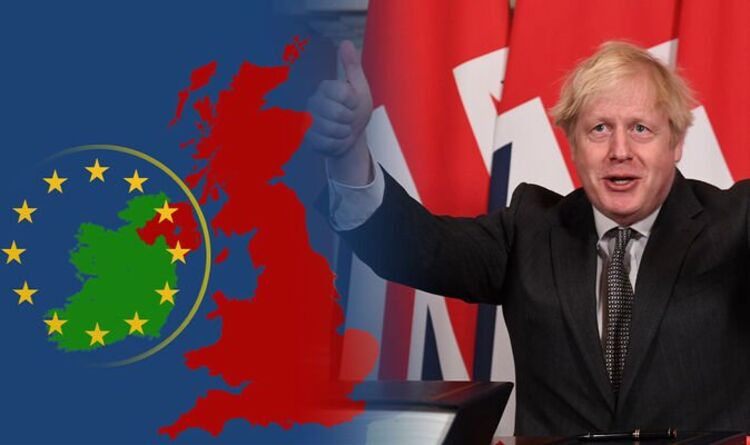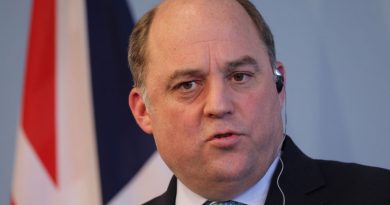Basically still in the EU! Brexit betrayal laid bare as Northern Ireland subject to EU law
Brexit: We must ‘do right by Northern Ireland’ says Davis
We use your sign-up to provide content in ways you’ve consented to and to improve our understanding of you. This may include adverts from us and 3rd parties based on our understanding. You can unsubscribe at any time. More info
Under the terms of the Northern Ireland Protocol – set out in the Brexit Withdrawal Agreement signed by the EU and UK – Northern Ireland is still subject to laws of the European Union, and is under the jurisdiction of the European Court of Justice (ECJ). The Protocol – designed to prevent a hard border on the island of Ireland – sees Northern Ireland subject to wide-ranging EU laws on product standards, customs, VAT and state aid, and grants the ECJ jurisdiction to rule on matters of EU law.
This week, Northern Ireland Secretary Brandon Lewis deemed the Protocol “not sustainable”, and said the current system was harming Northern Ireland’s ability to function as a member of the United Kingdom.
Speaking to the Northern Ireland Affairs Committee on Monday, Mr Lewis pointed out that businesses in Northern Ireland were subject to the same checks to move goods to the UK as the EU, even if they do not have any affiliation with EU businesses.
He said: “That is not sustainable. It’s not appropriate within the internal market in the UK, it’s certainly not what is going to be able to function for the benefit of the people of Northern Ireland. These are all issues we need to resolve.”
Last week, a House of Lords committee warned that the UK and EU needed to do more to explain to the public how updates to EU law could impact the people of Northern Ireland.
Under the agreements of the Northern Ireland Protocol, the region is still required to follow a significant amount of EU laws, though it has no say in them.


If these laws are changed or updated – which they often are as technical updates and revisions are published – Northern Ireland must follow them.
If the EU brings forward entirely new laws which will affect Northern Ireland, there is a formal consultation process with the UK Government through the oversight body known as the Joint Committee.
However, if the EU is amending or replacing existing laws, they automatically apply in Northern Ireland due to what is known as “dynamic regulatory alignment”.
In those cases, the scrutiny process is based on the UK Government producing “explanatory memoranda” for the people of Northern Ireland – it is the quality of these which the Lords have deemed “extremely poor”.
The committee implied that ongoing negotiations on the future of the Protocol were being used as an excuse by Governmental departments to provide insufficient information to the public.

The findings said: “Notwithstanding the ongoing discussions… the Government has an obligation, in the meantime, to set out the full implications of EU legislation applying to Northern Ireland under the protocol as it currently operates.”
The Department for Environment, Food and Rural Affairs (Defra) was the only department praised for the quality of its explanatory memoranda to the public.
Northern Ireland has been a sticking point in Brexit negotiations since the moment the UK voted to leave the EU.
The question of how to prevent a hard border on the island of Ireland – thereby protecting the Good Friday Agreement – while still allowing the UK to leave the EU and its single market saw one Prime Minister forced to leave her job, and is still unresolved today.
In recent months, the role of the ECJ in an independent Northern Ireland has come under enormous scrutiny.
DON’T MISS:
Data shows power of oligarchs with more money than Russia itself [INSIGHT]
Rishi Sunak’s family benefiting from company with Russia ties–EXPOSED [REPORT]
Hartley-Brewer defends UK Brexit freedom ‘We wouldn’t have done it!’ [VIDEO]
At the Conservative Party conference in October 2016, the new Prime Minister Theresa May said: “We are not leaving (the EU) only to return to the jurisdiction of the European Court of Justice. That is not going to happen.”
But it did happen – Northern Ireland is still under the jurisdiction of the ECJ, and it is still in the UK, meaning the UK is still under ECJ law.
In a paper published in July last year, the UK Government said it had only agreed to the ECJ’s role because of the “very specific circumstances” of the protocol negotiation.
Since then, it has been trying to negotiate a different system, with former Brexit Minister Lord Frost attempting to have the ECJ’s role removed.
But in December, Lord Frost resigned his post, saying he was “concerned about the current direction of travel” of the Government.

Talks between the UK and EU to try and find a suitable solution to the Northern Ireland issue are ongoing but have failed to yield any results.
Brandon Lewis told the committee that, over the last six to nine months he has not seen “the pragmatism or flexibility” from the EU that would allow a deal, adding “otherwise we would have agreed one by now”.
Democratic Unionist Party (DUP) MP Ian Paisley challenged Mr Lewis, saying: “The talk is very strong but I think most people wonder when is some action going to actually flow from that.”
Mr Lewis said the UK Government has not yet triggered Article 16, which would suspend some elements of the post-Brexit arrangements, because ministers want to find agreement for better stability and certainty for businesses.
He added: “I appreciate your point about where does patience run out. Our view is we will strain every last sinew to do this by agreement with the EU, and that’s the work that is continuing.”
Source: Read Full Article



